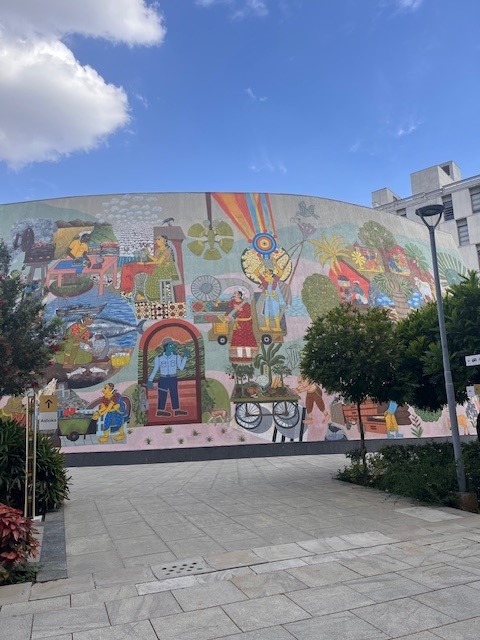The visit to Azim Premji University, Bangalore campus took place from 18 September to 22 September. Hannele Cantell and Riikka Suhonen from the University of Helsinki and Kristof Fenyvesi, Heidi Layne, Tuomo Virtanen and Pasi Ikonen from the University of Jyväskylä joined the delegation. Apoorwa Hooda and Tea Kangasvieri participated in the visit from the GINTL coordination team. The visit was closely planned in collaboration with faculty members from Azim Premji University to connect Finnish participants’ expertise with the needs of APU students and staff.
The visit aimed to bring together collaborating researchers across the different institutions to plan the future of their joint projects and taking a step towards encouraging sustainability of partnerships formed under the GINTL India network. First step towards sustaining the connections was the signing of Memorandum of Understanding between Azim Premji University, University of Jyväskylä and University of Helsinki. During this trip the participants from the three universities had space to discuss the future collaboration opportunities and share from the existing collaborations.
Background for the visit
The Azim Premji University (APU) is a not-for-profit private university in India committed to its social purpose of contributing to societal well-being and social justice through education. The university is closely connected to the Azim Premji Foundation, which has worked since 2000 with the elementary education system in rural government schools.
Personal relationships between the staff, students and alumni of Azim Premji University have created a basis for the collaboration during GINTL’s existence, 2021-2024. In Autumn 2021 a GINTL India delegation from UH and JYU visited the APU campus for the first time and discussed initial ideas to increase collaboration between the three universities. The visit was followed by a series of online meetings where the idea came up of such informal learning and knowledge sharing seminars between staff members of the three institutions. The purpose of the seminars was to foster connections between Indian and Finnish researchers in the field of education. The seminars concentrated on specific themes such as science education, language education, mathematics education, early childhood care and education and social science education. The series of knowledge sharing seminars concluded with one final event that was organised as a hybrid seminar at the Azim Premji University, Bangalore campus during the GINTL India delegation’s visit in September 2024. The seminar aimed at strengthening the understanding of the educational landscapes in both countries and offered a platform to initiate further research and academic collaboration across the three universities.
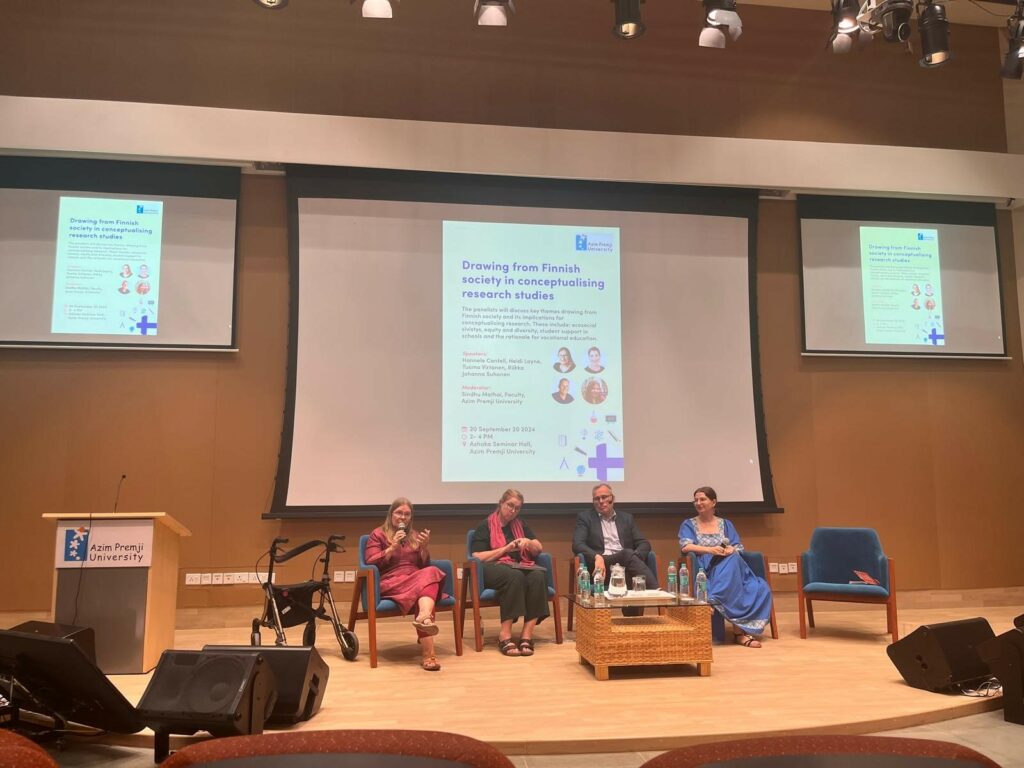
Apart from the seminar on 21-22 September, the delegation members had the opportunity to visit two local schools to understand better the local educational landscape. GPHS Kodathi is a government school for grades 1-12 that offers Nalli-Kalli teaching for grades 1-3 (meaning “joyful learning” in Kannada, Nalli-Kalli is a multi-grade, multi-level, activity-based teaching-learning methodology encouraged in schools in Karnataka). Since public schools in India largely or wholly cater to under-served communities, the school has various NGOs supporting the teachers and students, including the Gubbachi Learning Centre founded by alumni of Azim Premji University that works towards improving attendance and retention of students in school. To understand the diversity and different realities in schooling, the delegation also visited Sandeepani Academy, a private school that the university collaborates with for schoolteachers’ continuous capacity development as well as university students’ field and practical experiences including practice teaching. The delegation members hosted also workshops for students on various topics such as STEAM education, play-based learning, innovations in language education, sustainability education and field research.
Reflections from Hannele Cantell and Riikka Suhonen
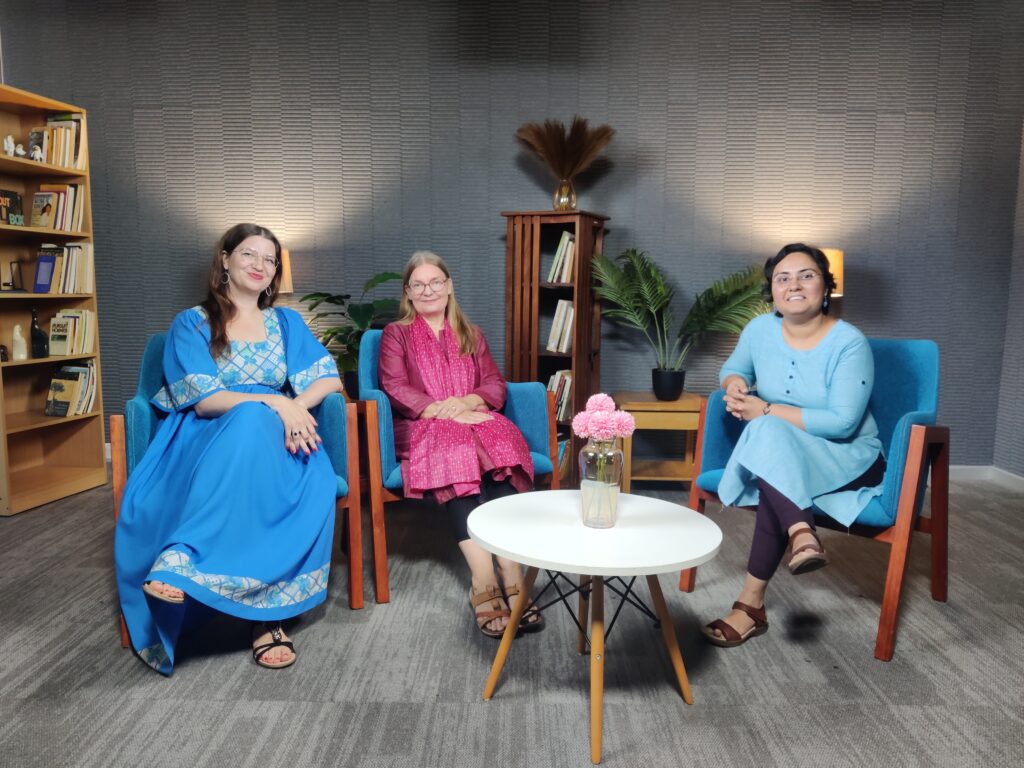
Hannele has a long history with both APF and APU, since 2011. She thinks that the most important link between APF/APU and GINTL work are the shared values of quality education and equity issues of the society. Hannele is also inspired by how the APU/APF work together and for governmental schools and teacher education in India. Because of these experiences, Hannele dared to suggest in the beginning of GINTL network APU/APF as a good and trust partner. Again, during this visit we got a great possibility to see the influence of their work both at campus and at school level.
For Riikka, it was her first visit to APU, but she had met some of the faculty during their visit to Finland, and in the online knowledge-sharing session. Throughout the week-long visit, we continued to be amazed by the kindness, hospitality, and overall excellent practical arrangements provided by the APU staff. We participated in a very rich programme with diverse perspectives, and are extremely grateful for having been part of this experience.
We were equally amazed by encounter the spirit of learning, sharing and criticality that was evident in the seminar presentations, discussion, and teaching we participated in. It was clear how every aspect of education and community work by APU aim at achieving tangible social change at the grassroots level. One of the research projects and methodologies we wanted to share with students in social studies was “utopian methodology”, or a research project called Pedagogy of Concrete Utopias (www.utopiaproject.fi) where both Hannele and Riikka have participated. In the teaching session, we only had time to go through one of the steps of this method where we asked the students to set up utopian visions for education in 2050. Many of the utopias designed by students revolved around equality of education.
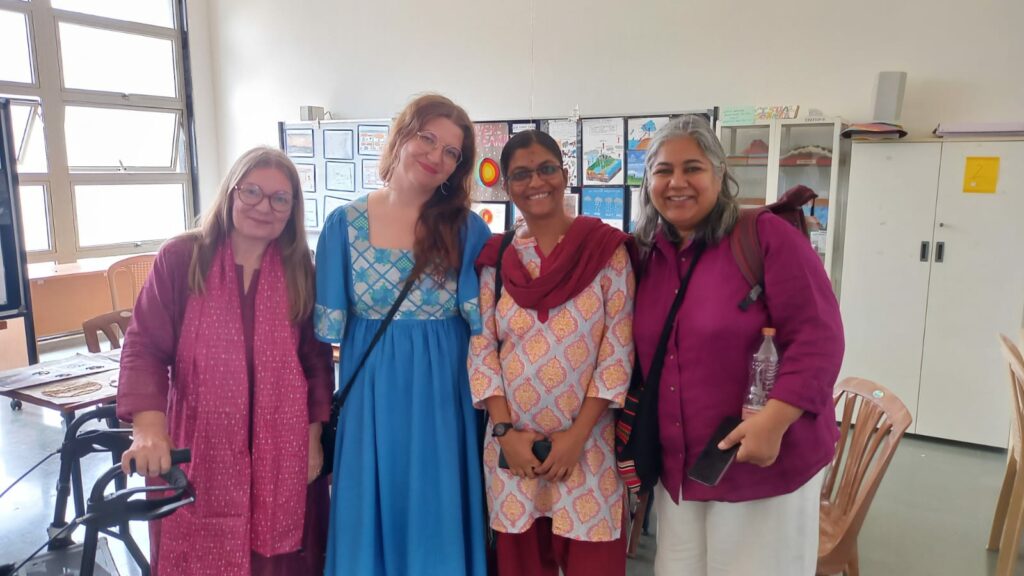
It also became evident during our time in APU that we have many shared interest areas, such as sustainability education, values and human rights in education, multi/interdisciplinary teaching, or questions of social polarisation which we could – and should – continue collaborating through joint research and teaching. Vocational education is another potential collaboration area, as Riikka’s ongoing PhD research focuses on the civic aspects of vocational education in Finland. In short, we remain certain that our collaboration continues in one form or another in the future!
Reflections from Kristof Fenyvesi, Apoorwa Hooda, Pasi Ikonen, Tea Kangasvieri, Heidi Layne, and Tuomo Virtanen
Returning to APU after two years was a pleasant and inspiring experience. We were greeted by many familiar faces, but also many new acquaintances. The welcome was overwhelmingly friendly, and the atmosphere encouraged closer cooperation. The hosting team, led by Kinnari Pandya and supported by Srihari Rao, had curated a full program that allowed us to meaningfully engage with both students and university staff. Azim Premji University’s campus, on its way to becoming fully sustainable, provided significant insight into and inspiration towards energy conservation, waste reduction, recycling, and inclusion through the green as well as accessible spaces promoting health and well-being for everyone. The most memorable experience, however, was a visit to two local schools. In particular, the visit to a government school where APU alumni were working to support the educational opportunities of children in difficult circumstances was impressive. It was equally inspiring to hear about the humane values of the foundation that works to improve the Indian education system, with a particular focus on the more disadvantaged areas of the country.
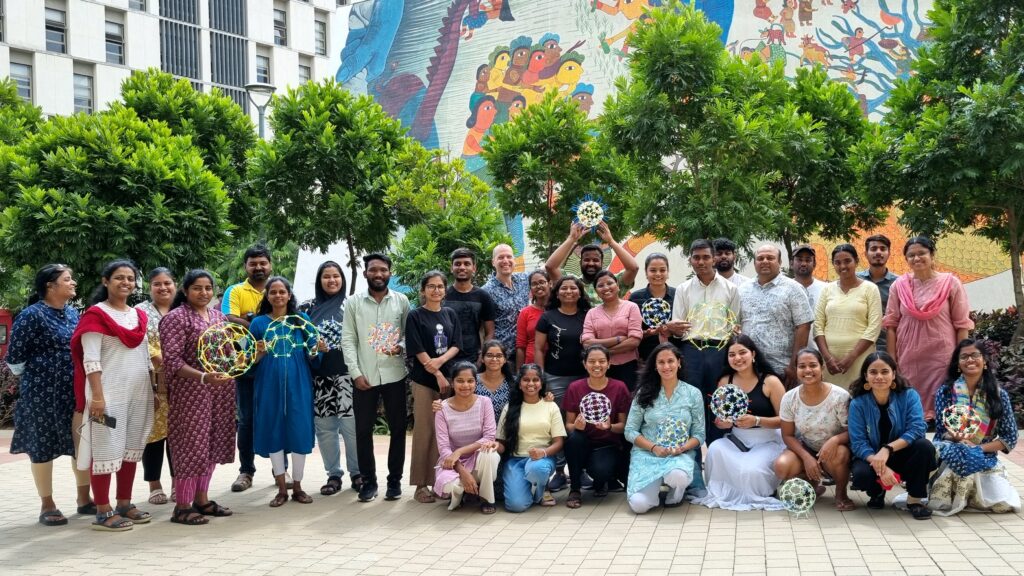
Another inspiring aspect of the school and university visits was seeing Indian schoolchildren, APU university students, and faculty actively engage in STEAM workshops that combined creative, scientific, and technological learning. Led by Sindhu Mathai (APU) and Kristof Fenyvesi (JYU), these sessions brought Finnish and Indian educators together to identify practical challenges and opportunities for integrating project-based, student-centered approaches with a focus on sustainability and planetary well-being. The hands-on experiences were contextualized by sessions on sustainability education facilitated by Heidi Layne (JYU) and Saswati Paik (APU), workshop on playful learning by Pasi Ikonen (JYU) with support from Ira Joshi (APU), an engaging dialogue with staff and students on language education by Tea Kangasvieri (JYU) along with Sharoon Sunny (APU), and Tuomo Virtanen’s contributions on classroom diversity, which provided strategies for inclusive teaching across cultural contexts. As doctoral researcher and alumnus of Azim Premji University, Apoorwa Hooda shared her journey and research work with potential future researchers at APU. Together, these workshops and sharing sessions highlighted the potential of both Finnish and Indian classrooms to become spaces where real-world problem-solving and creative inquiry flourish, supported by dedicated teachers and engaged students.
With the GINTL funding ending in the end of the 2024, the two-day seminar and other interactions provided us an opportunity to reflect on the opportunities for future collaboration. During the seminar, current joint projects were presented that consist of, but are not limited to joint teaching, publishing and supporting early-stage researchers. During the conversations, we learnt that despite the differences in the education systems, many challenges that educators are facing nowadays are similar, therefore collaborative learning opportunities are important both for students and us researchers.
We look forward to continuing our cooperation despite the end of GINTL funding. Keeping the locomotive rolling.
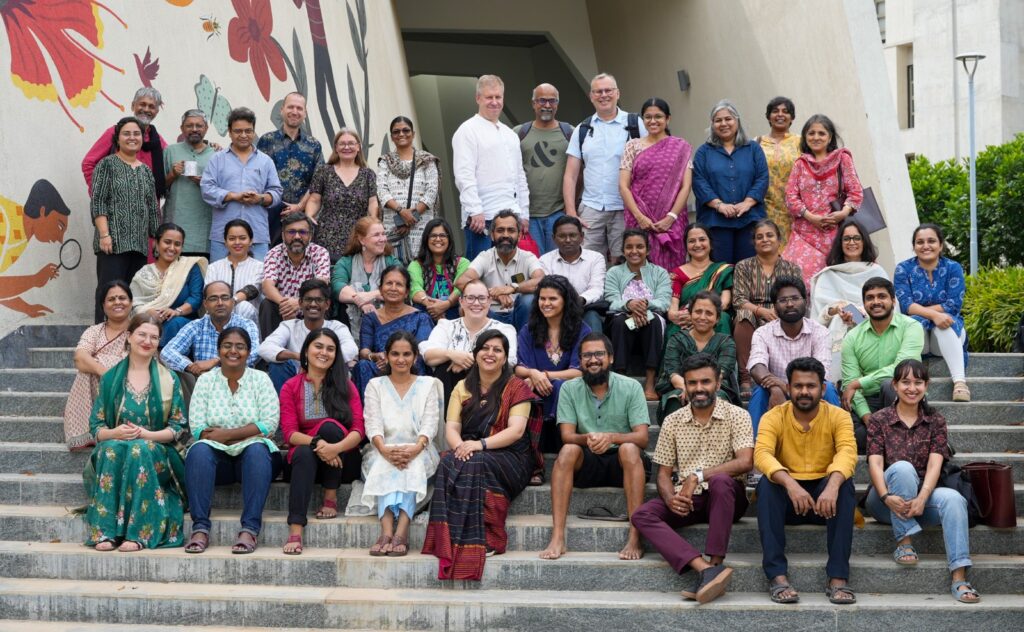
Authors (in alphabetical order):
Hannele Cantell | Senior Lecturer, Department of Education, University of Helsinki | staff page on UH web page
Kristof Fenyvesi | Senior Research, Finnish Institute for Educational Research, University of Jyväskylä | staff page on JYU web page
Apoorwa Hooda | University teacher, GINTL India Coordination, University of Jyväskylä | staff page on JYU web page
Pasi Ikonen | Member of executive board, Department of Teacher Education, University of Jyväskylä | staff page on JYU web page
Tea Kangasvieri | Network coordinator, GINTL India Coordination, University of Jyväskylä | staff page on JYU web page
Heidi Layne | Senior Lecturer, Faculty of Education and Psychology, University of Jyväskylä | staff page on JYU web page
Riikka Suhonen | Doctoral Researcher, Department of Education, University of Helsinki | research portal
Tuomo Virtanen | Senior Lecturer, Department of Teacher Education, University of Jyväskylä | staff page on JYU web page
